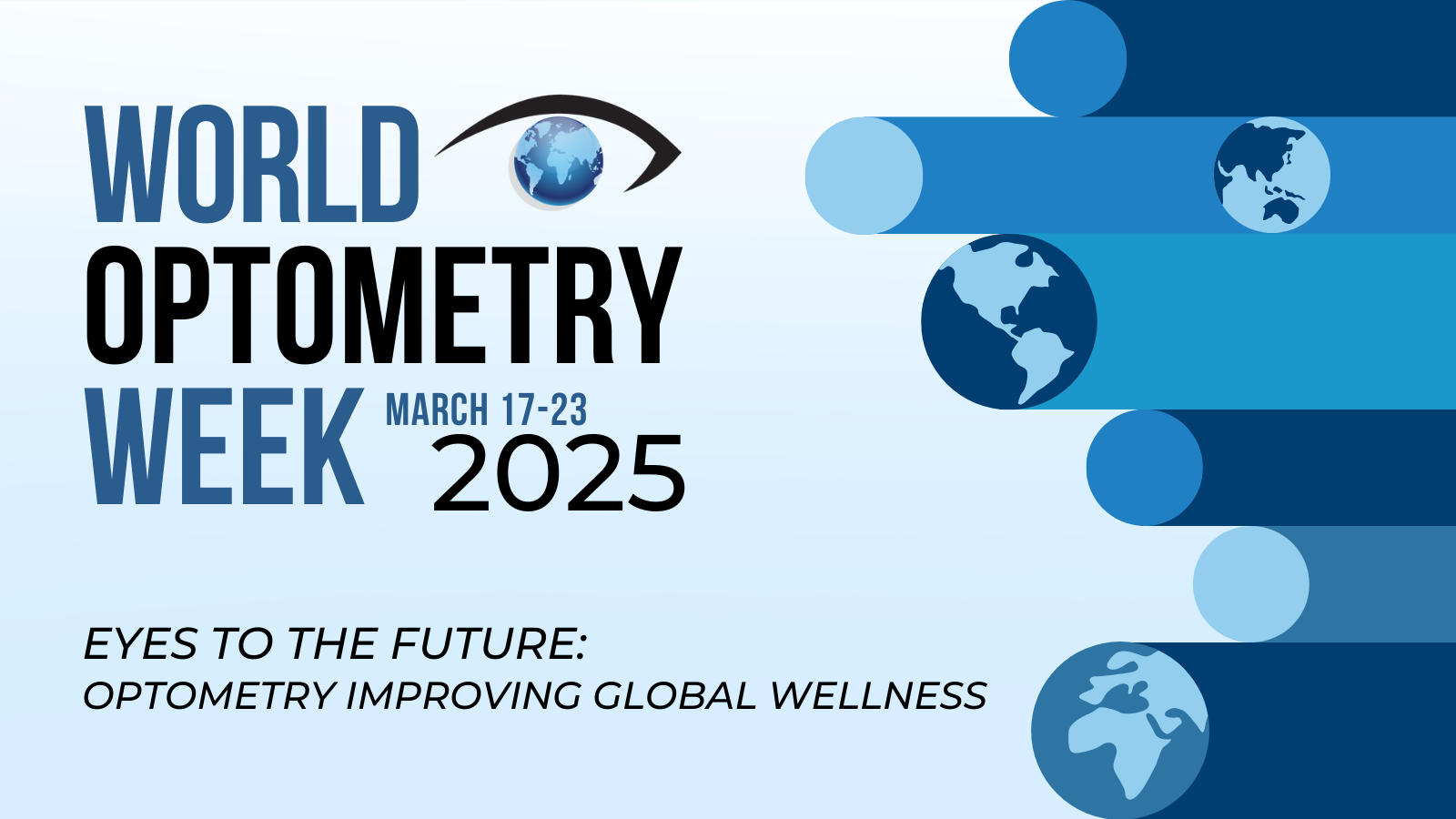Every year, the second Thursday of October is marked as World Sight Day, a global initiative dedicated to raising awareness about eye health, vision impairment, and the vital role eye care professionals play in our communities. In 2025, this important day falls on October 9th, and it offers an opportunity for everyone – from patients to practitioners – to focus on the importance of protecting and improving vision.
This blog explores the importance of World Sight Day, highlights the vital role of optical professionals, and demonstrates how Verovian Optical Recruitment Agency supports both practitioners and employers in building a strong, skilled workforce across the UK.
Vision is one of our most precious senses, yet around the world, millions of people suffer from preventable or treatable eye conditions. In the UK, conditions such as glaucoma, cataracts, macular degeneration, and diabetic retinopathy affect thousands each year, indicating the importance of accessible, high-quality eye care.
World Sight Day reminds us that eye health is not just a personal responsibility but a public one. It encourages early detection, regular eye examinations, and the promotion of awareness about how lifestyle, age, and systemic health conditions can impact vision.
The official theme for World Sight Day 2025 is “Love Your Eyes”. It encourages people to prioritise their eye health through preventive care, early detection, and lifestyle choices that protect their vision.
The campaign is led by the International Agency for the Prevention of Blindness (IAPB) in partnership with the World Health Organization (WHO), with UK support from organisations like RNIB and Sight Savers. These organisations promote awareness, community screenings, and education to reduce avoidable vision impairment.
For optical professionals, the theme highlights the critical role of skilled practitioners in protecting vision and ensuring accessible, high-quality eye care.

Optometrists, ophthalmic nurses, optical assistants, and dispensing opticians are the frontline guardians of eye health. They play a crucial role in:
1. Detecting early signs of eye disease
2. Providing accurate prescriptions for glasses and contact lenses
3. Educating patients about preventive eye care
4. Supporting patients with long-term vision conditions
Whether you work in optical care or want to prioritise your own vision, there are several ways to get involved:
World Sight Day 2025 serves as a timely reminder of the growing demand for skilled optical professionals. At Verovian Optical Recruitment Agency, we recognise the essential role these professionals play in safeguarding vision and enhancing the quality of life across the UK. Whether you are an experienced practitioner or just starting your career, we are committed to connecting you with rewarding temporary or permanent opportunities that align with your skills and ambitions.
We place opticians, optometrists, and ophthalmologists across hospitals, retail, community, domiciliary, and other clinical settings, ensuring organisations have the expertise needed to deliver exceptional patient care. Through rigorous screening and vetting, we match professionals with roles suited to their experience while providing continuous support to optimise recruitment and strengthen teams.
By joining our network, you gain access to exclusive roles, career development resources, and expert guidance. At the same time, optical practices benefit from dedicated, highly skilled staff ready to make a real difference. Together, we help build a strong, capable optical workforce across the UK.
World Sight Day 2025 is more than a day on the calendar – it’s a call to action. It’s a day to celebrate the life-changing work of optical professionals, promote eye health awareness, and encourage everyone to take steps to protect their vision.
At Verovian Optical Recruitment Agency, we are proud to support optical professionals in their mission to deliver excellent care. Ready to take the next step in your career? Register with Verovian Optical Recruitment Agency today and start exploring exciting opportunities that align with your expertise and aspirations.
Contract negotiation is one of the most important stages in an optical career, whether you are a newly qualified optometrist entering your first role or an experienced practitioner considering a new contract. A well-negotiated agreement sets the tone for your professional journey, helping you secure fair compensation, retain work-life balance, and align with your long-term career goals. Poorly negotiated contracts, on the other hand, can create stress, misunderstandings, and even litigation if disputes arise.
This guide explores the key aspects of contract negotiation in UK optometry, offering practical strategies, market insights, and red flags to help you navigate the process with confidence.
The first step before receiving the contract is clarifying your employment status. Are you an employee, a worker, or self-employed? Each category affects your rights and negotiating power.
Your status will shape which clauses are negotiable and how to frame your requests. It is important to understand the GOV.UK Employment Status Guide to ensure compliance with the law.
Successful negotiation is not about asking for what you need but highlighting the value you bring. Position your skills, subspecialties, and commitment to patient care as assets that will help the practice grow and retain patients. This shifts the conversation from personal gain to mutual benefit.
Ensure your contract specifies salary, locum rates, or hourly pay. Look for details on whether earnings are fixed, based on production, or linked to patient volume. This avoids misunderstandings and supports transparent discussions during future renegotiations.
Do not overlook fringe benefits. An employment contract should outline paid time off (PTO), vacation time, CPD or continuing education allowances, malpractice insurance coverage, association dues, and licensing fees. These extras are negotiable and can add significant value even if the salary is fixed.
Examine renewal provisions at the outset. A contract should state whether renegotiation is possible and clarify what happens if either party wishes to terminate. Pay attention to what amounts may be owed on termination and whether clauses allow the practice owner to change terms upfront without mutual consent.
Carry out due diligence before negotiations. Research market pay rates, review current market conditions, and understand the economic climate for UK optical practices.
One of the most effective negotiation tips is to benchmark against reliable salary data. The College of Optometrists provides guidance on typical salaries, helping you set realistic expectations.
Not every aspect of the contract is negotiable. Decide which terms to prioritise - whether that is higher pay, more paid holidays, flexible scheduling, or support for career consulting and continuing education.
Use the art of negotiation to position requests as a return on investment. Instead of “I need higher pay,” demonstrate how your expertise in certain optometric subspecialties or ability to handle high patient turnover supports the practice’s growth.
If you encounter complex clauses such as non-compete restrictions, malpractice insurance responsibilities, or contractual indemnities, it may be wise to seek professional guidance. For example, the AOP offers contract-checking services, while ACAS provides legal frameworks on UK employment contracts.

Understanding salary benchmarks provides leverage for successful negotiation. Salaries in UK optometry vary significantly depending on demographics, location of the practice, and employment setting.
Packages may be higher in high-demand regions or niche optometric subspecialties. When reviewing a new contract, look beyond salary alone. Evaluate the full benefits package, including CPD funding, vacation time, relocation support, flexible scheduling, and a healthy work-life balance. These additional terms often make a role more attractive than one offering a slightly higher base salary.
Certain aspects of the contract should trigger caution. Common red flags include:
If any of these appear in your contract, seek professional advice before signing.
As a specialist UK optical recruitment agency, we do more than connect professionals with opportunities. We help you secure contracts that align with your career goals and protect your interests. From highlighting current market conditions to flagging negotiable clauses, our consultants provide tailored guidance at every stage.
Whether you are a new optometrist entering the interview process, a locum seeking flexible arrangements, or an experienced professional moving into private practice, we help you successfully negotiate fair, transparent, and sustainable agreements.
Contract negotiation is not just about pay; it’s about aligning your professional value with fair terms and a supportive environment. By conducting due diligence, spotting red flags, and applying practical negotiation tips, optical professionals can secure contracts that promote career growth, stability, and satisfaction. With the right preparation and the support of a trusted recruitment partner, you can master the art of negotiation and secure opportunities that match your ambitions.
At Verovian Optical Recruitment Agency, we specialise in connecting optometrists and optical professionals with practices across the UK. From reviewing employment contracts to offering career consulting, we’ll help you navigate negotiations and secure fair, rewarding roles.
Contact us today to explore current opportunities and take the next step toward your career goals.
Mark your calendars! From March 17th to 23rd, 2025, the global eye care community will celebrate World Optometry Week, culminating in World Optometry Day on March 23rd. The World Council of Optometry (WCO) has unveiled the powerful theme, "Eyes to the Future: Optometry Improving Global Wellness." This theme underscores the transformative impact of optometry in building a healthier world. From preventing vision loss to pioneering cutting-edge technologies, optometry is redefining healthcare, ensuring clear vision and fulfilling lives for everyone. Join us as we explore the evolving landscape of optometry, the innovations driving change, and the strides being made toward global access to quality vision services.
Optometry's impact extends far beyond simple vision correction. It's a cornerstone of global healthcare, contributing significantly to overall wellness, disease prevention, and the detection of systemic health conditions. Think of it as a vital entry point within broader health systems. The World Council of Optometry (WCO) celebrates the tireless efforts of optometrists worldwide, who are actively breaking down barriers to care by expanding access, educating patients, and advocating for seamless integration of eye care into global health systems.
"As an optometrist and the President of WCO, I am proud to see how the care we offer our patients helps lead to increased awareness of health issues, more involvement in prevention of vision and overall health problems, along with early diagnosis, quality eyecare, and integration of vision and eye health as a part of universal health care," states WCO President Sandra Block.
With millions globally facing preventable vision impairment, optometry's role in ensuring equitable access to quality eye care, particularly in underserved regions, is more critical than ever.

Looking ahead, optometry's role in global healthcare is poised to become even more vital. The increasing global population, coupled with an ageing demographic and rapid urbanisation, presents considerable challenges for healthcare systems, especially in delivering sustainable eye care.
Optometry is uniquely positioned to lead the way in addressing these challenges. By expanding its role as a primary eye care provider within collaborative care models, optometrists are evolving their education and training to encompass not just vision correction but also the investigation, monitoring, and treatment of a wide range of eye diseases.
The WCO Competency Framework for Optometry, launched in March 2024, underscores the competencies needed for optometry to effectively participate in the international eye care agenda. This expanded scope is essential for meeting the growing demand for eye care, particularly in community or hospital settings with limited access. By integrating optometrists into multidisciplinary healthcare teams, countries can significantly improve the prevention and treatment of eye diseases and better serve their populations.
The WCO urges optometrists, healthcare leaders, and policymakers worldwide to prioritise eye care within the global health agenda.
"Through collaboration, innovation, and continued education, the global optometry community is preparing for the future, ensuring that the eyes of tomorrow are in capable hands," the organisation emphasises.
Optometry is about more than just sight; it's about transforming lives. On World Optometry Day 2025, we honour the professionals dedicated to enhancing eye health and champion universal access to quality vision care.
For those passionate about the future of optometry and eager to explore new opportunities, Verovian Optical Recruitment Agency is here to connect you with the right role. Register with us today to stay informed about the latest advancements and opportunities in the field.

In today’s rapidly evolving healthcare landscape, diversity and inclusion are more than just buzzwords—they’re strategic imperatives that can drive success in any optical practice. With the UK’s demographic makeup continually shifting, it’s essential for optical practices to not only recognise but also embrace the rich variety of backgrounds, perspectives, and experiences among their patients and staff.
In this post, we explore why diversity and inclusion (D&I) matter in optics and provide practical strategies for UK optical practice owners to integrate these initiatives into their day-to-day operations.
Diversity and Inclusion (D&I) in optics refers to the intentional efforts made by optical practices and businesses to create a workforce and patient experience that reflects and respects differences in race, gender, age, disability, socioeconomic background, and more. It ensures that both employees and patients are valued, heard, and provided with equitable opportunities and care.

Expanding your candidate pool is essential for building a diverse and inclusive optical practice. To attract a wider range of talent, advertise vacancies on platforms that reach diverse candidates and ensure inclusive hiring practices. Additionally, adopting blind recruitment—removing personal identifiers such as names and backgrounds from applications—helps eliminate unconscious bias, ensuring that hiring decisions are based solely on skills, experience, and qualifications. Partnering with a trusted recruitment agency like Verovian Optical Recruitment Agency can further streamline this process, connecting you with a diverse pool of highly qualified optical professionals while ensuring fair and inclusive hiring practices.
Create an environment where all employees feel welcomed and valued. This involves more than just hiring a diverse team; it means fostering a culture that actively supports and includes diverse perspectives. Encourage open dialogue, respect different viewpoints, and ensure that all staff members have a voice in decision-making processes.
Actively celebrating diversity within your optical practice is a powerful way to promote inclusivity and build a positive workplace culture. For example, recognising and celebrating cultural events such as Black History Month, Diwali, or Eid can help make all staff and patients feel seen and respected. You could also highlight the unique contributions of employees from different backgrounds, perhaps through spotlight features or internal awards. By promoting such inclusivity, your practice not only boosts employee morale but also shows patients that your practice is truly committed to equality and representation.
Investing in employee training and development is key to fostering a diverse and inclusive optical practice. Regular cultural competency workshops can help staff understand different cultural perspectives, address unconscious bias, and improve patient interactions. Additionally, implementing mentorship programmes provides valuable support for all employees, particularly those from underrepresented backgrounds, helping them develop their skills and progress in their careers. By prioritising continuous learning and professional growth, your practice can create a more inclusive workplace while enhancing the quality of patient care.
Establishing clear inclusion policies is essential for creating an equitable environment within your optical practice. These policies should promote fairness and inclusion at every level, ensuring that they are actively implemented and not just written guidelines. Additionally, it's important to conduct a regular review of your diversity and inclusion initiatives. Continuously assessing the effectiveness of these strategies, along with being open to feedback and adapting to changing needs, helps ensure your practice stays aligned with its D&I goals and creates a truly inclusive workplace.
Building local partnerships with community groups is a valuable way to understand the specific needs of diverse populations and tailor your optical services accordingly. By connecting with these groups, you can create more inclusive, accessible offerings that resonate with their unique needs. Additionally, gathering patient feedback on a regular basis is crucial for refining your services. Actively listening to your diverse patient base and using their insights helps ensure that your practice continually improves and remains responsive to the needs of all patients, fostering a more inclusive and patient-centered environment.
The evidence is clear: diversity and inclusion initiatives are not just ethical imperatives—they are also powerful drivers of business success. From enhancing patient care to fostering innovation and boosting staff morale, the benefits are manifold. For UK optical practice owners, the time is now to evaluate your current strategies and commit to a more inclusive approach.
By taking proactive steps to implement D&I initiatives, you can create a more welcoming environment for both your patients and your team, ultimately positioning your practice for long-term success.
Look no further— Verovian Optical Recruitment Agency is here to help. We are dedicated to connecting you with a diverse pool of qualified optical professionals who bring fresh perspectives and valuable skills to your team. Whether you're in need of permanent staff or locum professionals, we support your efforts in building an inclusive, dynamic team that not only elevates patient satisfaction but also drives business growth. Contact us today and take the first step toward fostering diversity and inclusion in your practice.
In the fast-paced world of optical practices, technical expertise alone is no longer sufficient to deliver outstanding patient care. While the ability to conduct accurate eye exams and recommend suitable eyewear is crucial, it is the soft skills that truly elevate the patient experience and foster a thriving practice.
In this blog post, we’ll explore what soft skills are, why they are so essential in optical settings, and how they can make a lasting impact.
Soft skills refer to personal attributes that enable someone to interact effectively and harmoniously with others. Unlike technical skills, which focus on knowledge and expertise, soft skills are about how you connect and engage with people. In optical practices, these skills are the key to building trust with patients and ensuring smooth collaboration within the team.
Patients often arrive at optical practices feeling anxious about their vision or overwhelmed by the choices of eyewear. This is where soft skills like empathy and active listening become invaluable. For instance, an optician who takes the time to listen to a patient’s concerns about progressive lenses can explain their benefits in a clear and reassuring manner, helping to alleviate any hesitation. This personalised approach not only builds trust but also ensures patients leave the practice feeling confident in their decisions.
A positive patient experience goes beyond providing accurate prescriptions. Soft skills play a significant role in creating a welcoming environment, whether it’s through a warm greeting at the reception desk or clear communication during the frame selection process. Imagine a patient who is nervous about their first eye exam. A friendly optometrist who explains each step of the process in simple terms can turn an intimidating experience into a pleasant one.
Optical practices rely on seamless teamwork between optometrists, opticians, and administrative staff. Strong interpersonal skills ensure effective communication and collaboration, leading to better patient outcomes. For example, when a receptionist communicates specific patient needs to the optician before an appointment, it allows the team to prepare adequately and deliver tailored care.
Soft skills are not only beneficial for patient care but also for career growth. Professionals with strong communication, problem-solving, and leadership abilities are more likely to advance into managerial or supervisory roles. A practice manager, for instance, needs to resolve conflicts, motivate their team, and adapt to new challenges—all of which require refined soft skills.

Here are the key soft skills every optical professional should cultivate to enhance patient care and foster effective teamwork:

Many professional organisations offer workshops and online courses focused on customer service, communication, and emotional intelligence. For example, the College of Optometrists provides resources to support the development of interpersonal skills in practice.
Developing strong communication starts with practising active listening—giving your full attention to patients and colleagues, avoiding interruptions, and confirming your understanding of their concerns. By showing that you value their input, you build trust and rapport.
Additionally, seek regular feedback to continuously improve your interactions. For example, ask a colleague how effectively you explained a treatment plan or request feedback from patients on their overall experience. Combining active listening with a willingness to learn ensures you’re always growing in your ability to connect and communicate effectively.
Identify specific soft skills you want to improve, such as explaining complex terms simply or managing conflicts with team members. Use tools like the SMART goal framework to create actionable plans for growth.
Experienced optical professionals who excel in patient care can offer valuable insights and guidance. Shadowing a mentor can help you observe best practices and adopt strategies for effective communication and teamwork.
Read articles, attend webinars, and stay informed about best practices in patient communication and teamwork. Platforms like Optometry Today regularly publish insights and tips for optical professionals.
In today’s optical practices, soft skills are no longer optional—they are essential. From building trust with patients to fostering a collaborative workplace, these skills enhance every aspect of patient care and professional development. By investing in the growth of your soft skills, you can create meaningful connections, improve patient satisfaction, and set yourself apart as a well-rounded optical professional.
Start your journey towards mastering soft skills today and see how they can transform your practice and career.
Whether you're just starting out in the optical industry or ready to take your career to the next level, Verovian Optical Agency is here to support you. We specialise in connecting optical professionals with a wide range of exciting locum and permanent roles across the UK in opticianry, optometry, and ophthalmology. With tailored opportunities that align with your skills and passion, we make sure you find a role that suits your career aspirations. Register with us today, and let’s work together to find your next career move!
The eyecare industry is vital to public health, with professionals playing essential roles in preserving and improving vision. However, the distinctions between opticians, optometrists, and ophthalmologists can sometimes be unclear. For aspiring eyecare professionals, understanding these differences is crucial for making informed career decisions and exploring the diverse opportunities within the field. Each role is integral to the patient journey but requires unique skills, training, and responsibilities.
This blog post will uncover the specific roles, educational pathways, and career prospects in eyecare, offering valuable insights to help you navigate this rewarding profession.
Opticians are often the first point of contact for patients who need vision correction, but their role is different from that of optometrists and ophthalmologists. They’re not responsible for diagnosing eye conditions or prescribing treatments but instead work closely with optometrists and ophthalmologists to provide essential services related to eyewear.
A dispensing optics course is three years in total, and there are three modes of study to choose from.
Once you've completed your qualification, you'll need to register with the General Optical Council (GOC). The GOC is the regulatory body for the optical professions in the UK. Registration ensures that you meet the required standards of practice and professional conduct.

Optometrists play a far more diagnostic role in eye health. They are the primary healthcare professionals who conduct eye exams to assess and correct vision issues and diagnose common eye conditions. Optometrists play a key role in assessing eye health and prescribing corrective lenses, but they do not perform surgery.
To become an optometrist in the UK, you must complete a degree in optometry, typically taking three years to finish. After graduation, you must also complete a pre-registration period of supervised practice, which lasts about a year. Upon successful completion of this training, you must register with the General Optical Council (GOC) to practice as an optometrist. Optometrists can pursue further qualifications and specialisations, such as in contact lens fitting or low vision, to expand their career options.
Ophthalmologists are medical doctors who specialise in both the medical and surgical treatment of eye diseases. While optometrists can detect and diagnose common conditions, ophthalmologists are the ones who treat complex eye issues, often through surgery. They are experts in managing conditions like retinal diseases, cataracts, corneal transplants, and even eye cancers.
Ophthalmologists carry a range of responsibilities, which include:

Becoming an ophthalmologist in the UK involves a lengthy and rigorous educational journey. Here's an overview of the typical pathway:
Once their training is complete, ophthalmologists are required to register with the General Medical Council (GMC) to legally practice medicine in the UK. This registration ensures they meet the necessary professional standards and are qualified to provide safe and effective patient care.
Although opticians, optometrists, and ophthalmologists each have distinct roles, they often work together to ensure that patients receive the best possible care. For example, an optometrist may refer a patient with a suspected eye disease to an ophthalmologist for further treatment, while the optician will help provide the eyewear that the patient needs once their prescription is determined.
This collaboration is crucial in ensuring that patients not only receive the correct diagnosis but also the right treatment and follow-up care. If you decide to pursue a career in one of these fields, you can expect to work closely with professionals from the other two areas, ensuring that patients receive well-rounded and comprehensive eye care.
Choosing a career in the eyecare sector depends on your interests, skills, and aspirations. If you enjoy hands-on, client-facing work and have an interest in vision correction, a career as a dispensing optician may be the perfect fit. It offers opportunities to help people enhance their daily lives through better vision while also allowing you to develop technical and interpersonal skills.
If you're passionate about diagnosing and treating eye health, optometry offers an exciting career with the chance to make a real difference in patients' lives. As an optometrist, you'll have the ability to detect and manage a wide range of eye conditions and help patients maintain healthy vision.
For those drawn to the medical side of eyecare, ophthalmology offers the opportunity to specialise in advanced treatments and surgeries. Although the training path is long, ophthalmologists have the chance to provide critical care for patients with serious eye conditions and perform life-changing surgeries.
Whether you're drawn to the technical, hands-on nature of opticianry, the diagnostic and preventive work of optometry, or the advanced medical treatments offered by ophthalmology, the field of eyecare is full of opportunities. Understanding the distinct roles within this sector will help you make an informed decision about the path that’s right for you.
Each role has its own set of rewards and challenges, but they all share a common goal: improving and protecting the vision of people around the world. So, if you’re ready to embark on a fulfilling career in eyecare, now’s the time to explore which professional role best aligns with your passions and aspirations.
Whether you're just starting out in the eyecare industry or looking to take your career to the next level, Verovian Optical Agency is here to support you every step of the way. With a wide range of opportunities in opticianry, optometry, and ophthalmology, we help eye care professionals like you find roles that align with your passion and skills.
By partnering with Verovian Optical Agency, you gain access to expert guidance, personalised job matches, and valuable industry insights. Register with us today and let us help you take the next step in your journey to a rewarding career in eyecare.
During its recent virtual meeting on 24–25 September, the General Optical Council (GOC) approved updated Standards of Practice for Optometrists and Dispensing Opticians, as well as refreshed guidelines for Optical Students and Optical Businesses. These new standards, which will come into effect on 1 January 2025, align with the start of the new CPD cycle. They introduce key updates designed to enhance patient care, promote ethical practices, and support ongoing professional development.
This post will guide you through these latest updates, focusing on the key elements that are shaping how optometrists and dispensing opticians will continue to provide high-quality care and support to patients in line with the refreshed standards.
Standards of practice are crucial in ensuring that healthcare professionals are equipped to meet the needs of their patients while adhering to the highest professional and ethical standards. In optometry, these standards cover everything from patient interactions to the safe use of new technologies and procedures. Updated guidelines provide a clear framework for how optometrists and dispensing opticians can operate safely, ethically, and effectively, ultimately improving patient outcomes and trust in the profession.
The General Optical Council (GOC) Standards of Practice set clear expectations for the behaviours, attitudes, conduct, and professional practice of registrants. They define the minimum level of care that patients and the public can expect from optical professionals and serve as a guide in assessing the fitness to practice of individuals within the field.
The recent changes to these standards come after an extensive consultation process involving key stakeholders, including patients and the wider public. This collaborative approach ensures that the updated standards reflect both advancements in practice and shifts in societal expectations. For instance, the growing use of digital technologies in optometry has been integrated into the new guidelines, acknowledging the impact of these tools on both patient care and the profession. Additionally, more emphasis has been placed on the importance of registrants identifying themselves and their roles during consultations, aligning with patients’ increasing demand for transparency and clarity in healthcare interactions.

The updates made are designed to enhance the clarity and alignment of the GOC standards, ensuring they reflect emerging changes within the sector. While the majority of the existing standards remain unchanged, key modifications have been introduced in the following areas:
The revised standards will be officially launched on 1 January 2025, replacing the current ones. Until that date, the existing standards will remain in effect. You can view the revised standards on the GOC website ahead of their launch. Once the updated standards are in place, it will be mandatory for you to follow them.
In the coming weeks, there will be several opportunities for you to learn more about the changes and their impact. Be sure to stay updated for more information as Autumn progresses.
As the launch of the revised GOC Standards of Practice approaches, you must prepare for a new era of professionalism and patient care. These updates provide an opportunity to embrace advancements in technology, promote inclusive workplace cultures, and enhance patient trust. By familiarising yourself with the new standards and engaging with upcoming learning opportunities, you’ll be ready to lead the way in delivering high-quality, ethical care. The future of optometry is evolving—make sure you’re prepared to meet it head-on.
At Verovian Optical Recruitment Agency, we understand the importance of staying ahead in your profession, especially as industry standards continue to evolve. Whether you're a seasoned optometrist or a dispensing optician, we’re here to help you find a role that aligns with your skills, experience, and career goals. Explore our wide range of job opportunities and take the next step towards a fulfilling and rewarding career.
In the ever-evolving landscape of healthcare, particularly within optical practice, the pursuit of excellence is not just a goal—it’s an ongoing journey. At the heart of this journey lies Continuing Professional Development (CPD), a crucial pillar for optometrists and optical practitioners dedicated to delivering top-tier care.
This blog explores the multifaceted role of CPD in the optical profession. We’ll delve into how CPD not only enhances clinical skills and knowledge but also empowers practitioners to adapt to new technologies and embrace emerging best practices.
Enhanced Skills and Knowledge:
Staying current with the latest advancements in optical practice is essential, and CPD ensures that you continually build on your knowledge and skills, enabling you to offer the highest quality care. As the optical industry evolves, with new technologies and innovations regularly emerging, CPD helps you seamlessly integrate these advancements into your practice. Whether you’re learning to use new diagnostic tools or incorporating digital solutions for patient care, ongoing education through CPD keeps your practice up-to-date, efficient, and aligned with the latest industry standards.
Career Advancement:
Engaging in CPD opens doors to career progression. As you expand your expertise, you may qualify for higher-level positions, specialisations, or leadership roles within your practice or organisation. It also enhances your competitiveness in the job market, as employers often seek professionals who demonstrate a commitment to their field through continuous learning.
Professional Credibility:
Consistently participating in CPD activities bolsters your professional reputation. It showcases your commitment to maintaining high standards in your practice and your dedication to delivering the best possible care to your patients. This credibility can lead to greater trust from both patients and colleagues, further establishing you as a respected expert in your field.
Improved Patient Outcomes:
The ultimate goal of ongoing learning is to improve patient care. By staying informed about the latest developments in optometry and related fields, you’re better equipped to diagnose, treat, and manage a wide range of eye health issues. This not only leads to better patient outcomes but also increases patient satisfaction and loyalty.
Compliance with Regulatory Requirements:
Participating in CPD is often a mandatory requirement for maintaining your professional license. Regularly updating your knowledge and skills through CPD ensures that you remain compliant with industry regulations and avoid any legal or professional issues that could arise from non-compliance.

The General Optical Council (GOC) mandates that optical professionals complete specific Continuing Professional Development (CPD) requirements to stay current with industry advancements. These activities must span four core domains: Professionalism, Communication, Clinical Practice, and Leadership & Accountability. By December 31, 2024, which marks the end of the current CPD cycle, all dispensing opticians and optometrists must accrue at least 36 CPD points, including 18 interactive points and a peer review. Dispensing opticians on the contact lens specialty register must also earn 18 points in the contact lens domain and complete a contact lens peer review.
CPD activities for optical professionals in the UK can be broadly categorized into formal and informal options, each offering unique learning opportunities.
Formal CPD activities are structured and typically involve direct interaction with peers or educators. These activities, often organised by accredited providers, are essential for meeting professional standards.
Informal CPD activities are more flexible and allow professionals to tailor their learning to their specific needs. These activities may not always result in formal qualifications, but they are invaluable for continuous professional development.

Time Management: Balancing CPD with your daily responsibilities can be challenging. Consider scheduling regular time slots for CPD activities or integrating learning into your routine workday to ensure consistency.
Selecting the Right CPD Activities: Choose the activities that are relevant to your role and interests. For example, if you’re an optical dispenser, workshops on new lens technologies or patient communication techniques may be particularly beneficial.
Building a CPD Plan: Create a structured plan that outlines your learning goals and tracks your progress. This plan can help you stay organised and ensure that you meet your professional development objectives.
Continuing Professional Development (CPD) is more than just a regulatory requirement; it’s essential for maintaining excellence in optical practice. By committing to ongoing learning, you not only refine your skills and expand your knowledge but also enhance the quality of care you provide to your patients.
At Verovian Optical Agency, we believe that your career deserves the best opportunities. While we specialise in offering amazing job opportunities to optical professionals across the UK, we encourage you to make continuous learning a cornerstone of your career. Explore the wide range of CPD opportunities available, create a structured plan for continuous learning, and remain dedicated to achieving the highest standards in your practice. Register with us today, and let’s take your career to the next level together!
In the dynamic landscape of today's workforce, locum professionals play a vital role in meeting the growing demand for temporary positions in the optical industry across the UK. Navigating the locum environment can be exciting and challenging. One key factor that can significantly enhance your locum experience is partnering with a reputable agency. In this article, we will explore the importance of working with an Agency as a locum professional and the benefits it brings to your career.

Streamlined Job Search
Locum agencies serve as invaluable intermediaries between professionals and employers, offering access to a vast network of job opportunities. Instead of spending hours scouring job boards or handling the logistics of job applications, agencies streamline the process, connecting you with positions that align with your skills and preferences. This not only saves time but increases the likelihood of finding the perfect locum assignment quickly.
Administrative Support
The administrative aspects of locum work can be overwhelming. Agencies can step in to handle paperwork, contracts, and the intricacies of licensing and credentialing processes. This support not only ensures compliance with regulations but also allows you to focus on what you do best, providing quality care. While the agency takes care of the administrative burden.
Negotiation and Compensation
Securing fair compensation and benefits is a crucial aspect of any job, and locum professionals are no exception. Agencies have dedicated teams to negotiate competitive rates on your behalf. This will not only ensure that you are appropriately compensated for your skills and experience but also simplify the negotiation process, making it a win-win for both you and the hiring institution.
Flexibility and Variety of Assignments

One of the key characteristics of locum work is the flexibility it offers. They enhance this flexibility by providing access to a diverse range of assignments. Whether you are interested in exploring different specialties, settings, or locations, working with an agency opens doors to a variety of opportunities, allowing you to tailor your locum experience to your professional and personal preferences.
Risk Mitigation and Professional Guidance
Navigating the legal and regulatory landscape of locum work can be complex. Agencies can serve as valuable guides, offering professional advice on everything from compliance issues to career decisions. In challenging work situations, having an agency by your side provides a support system, helping you navigate difficulties and ensuring a positive locum experience.
Building a Long-Term Relationship with an Agency
Establishing a long-term relationship with a locum agency goes beyond securing individual assignments. It is about building trust and maintaining open communication. our reliable agency becomes a partner in your career journey, offering ongoing support, insights, and opportunities for continuous growth. Testimonials and success stories from locum professionals highlight the strength of these enduring partnerships.
At Verovian Optical Agency, we are a specialist in Locum Recruitment for Optical Professionals across the United Kingdom. We take pride in building a strong reputation for our innovative methods, guaranteeing satisfaction and results by providing locum assignments tailored to your preferences. Our user-friendly platform and mobile application will help you manage your assignments and schedules, book shifts, and communicate with colleagues effortlessly, even when you are on the move. As part of our registered members, you become part of a team that positively influences lives every day. You will thrive in diverse environments, honing your skills while adapting to varying practices. Our clients rely on us for top-notch Locum Professionals, ensuring a steady flow of assignments all year round. Furthermore, you will be opportune to work closely with our dedicated consultants and earn a referral bonus of up to £200.
In conclusion, working with a locum agency is not just about finding jobs, it is about shaping a fulfilling and rewarding career. The advantages of streamlined job searches, administrative support, negotiation assistance, flexibility, risk mitigation, and ongoing professional guidance make the partnership with an agency indispensable for locum professionals. As you embark on your locum journey, consider the possibilities that a reputable agency like Verovian Optical Recruitment Agency can offer in enhancing your career.
Welcome to our informative blog dedicated to carefully directing the General Optical Council (GOC) registration process for optical professionals. The General Optical Council plays a crucial role in ensuring the competency and ethical standards of optometrists, dispensing opticians, contact lens opticians, and other eye care professionals. In this guide, we will explore the significance of General Optical Council registration, detailing who needs to register, the step-by-step process certified identification form, and the ongoing requirements for maintaining registration. Whether you are a seasoned practitioner or a student embarking on a career in optics, this blog aims to simplify the complexities of General Optical Council registration, offering valuable insights and tips to help you navigate this essential aspect of your professional journey.

The General Optical Council (GOC) is an independent statutory body created by the Opticians Act 1958, and the current governing legislation is the Opticians Act 1989 to regulate optical professionals in the UK. Its primary purpose is to protect the public by setting and maintaining high standards of competence and conduct within the optical sector. The GOC oversees optometrists, dispensing and contact lens opticians, domiciliary opticians, store base opticians, student opticians, and optical businesses, ensuring that they adhere strictly to the established standards and codes of practice. The following are the key requirements to be on the General Optical Council register.
Public Protection: One of the primary benefits of the GOC is the protection of the public. By setting and enforcing high standards, the General Optical Council ensures that optical practitioners provide safe and effective eye care services, instilling confidence in the public and promoting overall eye health.
Professional Credibility: The GOC enhances the credibility of optical professionals by establishing a framework that emphasizes education, competence, and ethical conduct. Being registered with the GOC signifies to the public and colleagues that a practitioner has met rigorous standards and is committed to maintaining professional excellence.
Quality Assurance: Through its oversight of education, training, and practice standards, the GOC contributes to the overall quality assurance in the optical profession. This commitment to excellence benefits both practitioners and the public by ensuring that eye care services consistently meet high standards.

By following these tips, aspiring optical professionals can enhance their chances of successfully crossing the registration process, paving the way for a fulfilling and compliant career in the field of optics.
You can access your MyGOC account. This area of the website will allow you to update your details, download a receipt, set up a direct debit, and complete annual retention. The registration year runs from 1 April to 31 March. Your annual renewal fee will be due by 15 March each year.
Maintaining General Optical Council registration involves an ongoing commitment to professional development and adherence to established standards. Continuous engagement in relevant continuing education, attending GOC-approved courses, and participating in activities that contribute to one's skills and knowledge are essential. Practitioners must document their Continuing Professional Development (CPD) activities and stay informed about any updates or changes in GOC requirements. Adhering to the GOC's code of conduct, ethical guidelines, and practice standards is crucial.
Our Recruitment Agency can help you maintain the General Optical Council (GOC) registration. While the primary responsibility for maintaining GOC registration lies with the individual practitioner, Our Recruitment Agency can assist by providing guidance on the ongoing requirements and facilitating access to relevant training opportunities.
We offer information about GOC-approved courses, Continuing Professional Development (CPD) opportunities, and updates on regulatory changes. To be part of our Agency kindly visit our website at https://verovian.vision/register/. Our Agency also provides insight into understanding the GOC standards of practice, code of conduct, and ethical guidelines, ensuring that candidates are well-informed and compliant.
However, candidates need to take a proactive role in managing their GOC registration, staying informed about requirements, and actively participating in professional development activities. The collaboration between candidates and a recruitment agency can contribute to a holistic approach to career development within the optical field.
In conclusion, embarking on the journey of the General Optical Council registration is a commitment to excellence in the optical profession. By understanding and fulfilling the requirements, staying informed, and actively participating in professional development, aspiring and practicing optical professionals pave the way for a successful and fulfilling career. The collaboration between individuals and supportive resources, like our recruitment agency, contributes to a seamless and enriching registration process, ensuring the highest standards in eye care. Best of luck on your path to GOC registration.
